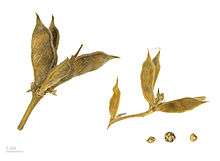Lupinus luteus
| Lupinus luteus | |
|---|---|
 | |
| Scientific classification | |
| Kingdom: | Plantae |
| (unranked): | Angiosperms |
| (unranked): | Eudicots |
| (unranked): | Rosids |
| Order: | Fabales |
| Family: | Fabaceae |
| Genus: | Lupinus |
| Subgenus: | Lupinus[1] |
| Species: | L. luteus |
| Binomial name | |
| Lupinus luteus L. | |

Lupinus luteus is known as annual yellow-lupin[2] or European yellow lupine. It is native to the Mediterranean region of Southern Europe.[3] It occurs on mild sandy and volcanic soils in mining belts. As a wild plant, it is widespread over the coastal area in the western part of the Iberian Peninsula, Morocco, Tunisia, and Algeria, on the islands of Corsica, Sardinia and Sicily and in Southern Italy. It is most likely that in Israel and Lebanon it has turned wild. Cultivated in Northern Europe and the CIS (Belarus and Ukraine) as well as, on a smaller scale, in Western Australia and South Africa. Having previously been cultivated in southern France and on Madeira, it has turned wild there. Using combinations of such characters as the colour of the corolla, the carina’s edge, vegetative organs and seeds, 18 varieties, 4 subvarieties and 6 forms have been identified.[4] The plant's yellow seeds, known as lupin beans, were once a common food of the Mediterranean basin and Latin America. Today they are primarily eaten as a pickled snack food.
References
- Kurlovich B.S. 2002. Lupins. Geography, classification, genetic resources and breeding, St. Petersburg, “Intan”, 468p. http://personal.inet.fi/tiede/lupin/
- Gladstones, J.S. 1998. Distribution, Origin, Taxonomy, History and Importance. In: J.S. Gladstones et al. (eds.), Lupin as Crop Plants. Biology, Production and Utilization, 1-39.
External links
| Wikimedia Commons has media related to Lupinus luteus. |
- Plants for a Future: PFAF treatment of Lupinus luteus
- USDA PLANTS: Profile for Lupinus luteus (European yellow lupine)
- Classification for Kingdom Plantae Down to Genus Lupinus "L".
- Lupinus luteus Israel Wildflowers